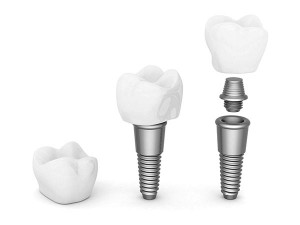Learn What to Expect After Getting Dental Implants

Having dental implants can make the world of difference to how you chew, talk, and smile. This is why millions of Americans are choosing to get dental implant surgery each year. It is important, as you get an implant, to remember that in order for these implants to be successful they have to be surgically installed into your gums. Oral surgery is not overly complicated, and the recovery times are short, but you will be undergoing a surgical process and should plan on the appropriate recovery time. Since there is typically anesthesia involved in dental implant surgery, you will need to wait for some time before being able to drive. This is why we recommend bringing someone who can act as your designated driver after the surgery is over.
Dental implants heal very quickly, as long as you follow the instructions that we provide you with after the procedure is over. Taking care of the site of the implant and making sure that you do nothing to introduce an infection are important steps. Also, realizing that you have just undergone a minor surgery and giving yourself enough recovery time from strenuous activity, is important to the overall healing process. If you have any questions at all, we would like to answer them before you leave. If, however, you have questions after you get home, please call us so that we can give you the best medical advice possible.
The most important thing to remember during your recovery is not to touch the site of the implant. As the anesthesia starts to wear off, it is human nature to want to touch and feel the implant and the site around it. This is not recommended and you should try to prevent your tongue from wandering into that area. Dental implants are surgically installed so there is always a chance for an infection, which is why we do not want you touching the site with your fingers.
To prevent an infection, we will be prescribing an antibiotic for you to take as well. Typically these will start the day after the surgery and will consist of a course that lasts several days. Make sure to stick to the antibiotic routine. We will also give you an oral rinse, which is medicated, to rinse your mouth out at least 3-4 times per day. Combining this with rinses of salt water will help to speed up the healing of the dental implant and will also combat infections.
Bleeding or spotting of blood in the saliva is perfectly natural for the first 24 hours. We will provide you with gauze to place on the bleeding area with very mild pressure. This will help to stop the bleeding, which will cease after the first day. You may experience some discomfort after the anesthesia has worn off, for which we recommend an over the counter pain medication. Advil, Motrin, or Tylenol can all help to ease any discomfort you may have associated with the dental implant.
Related Posts
Dental implants can bring back stability and aesthetic value to your mouth. Losing at least one tooth can affect your appearance. It can also affect the way you interact with other people. Getting implants is a big decision. That is why you need to know what the procedure entails. Here are the things you should…
Most people want to have dental implants right after dental extraction. Replacing the lost tooth is a priority. This can prevent more complications as the mouth heals. Understanding the process of getting implants after dental extraction can help prepare you for your appointment. Here are the details about getting dental implants after a dentist removes…
Dental implants are long-lasting, permanent tooth replacements. They are a popular choice among patients for their durability and ability to look and feel like natural teeth. However, dental implants are an investment, and they should be cared for as such. Follow the tips below to help extend the life span of your implants and prevent…
Dental implants are effective, long-lasting artificial teeth. Implants are surgically attached to the jawbone to look and function like natural teeth. As a result, patients can chew, talk, and laugh without worrying about dentures slipping. They also improve oral health. This article explores when and why to get implants and the qualifying factors for treatment.Patients…
